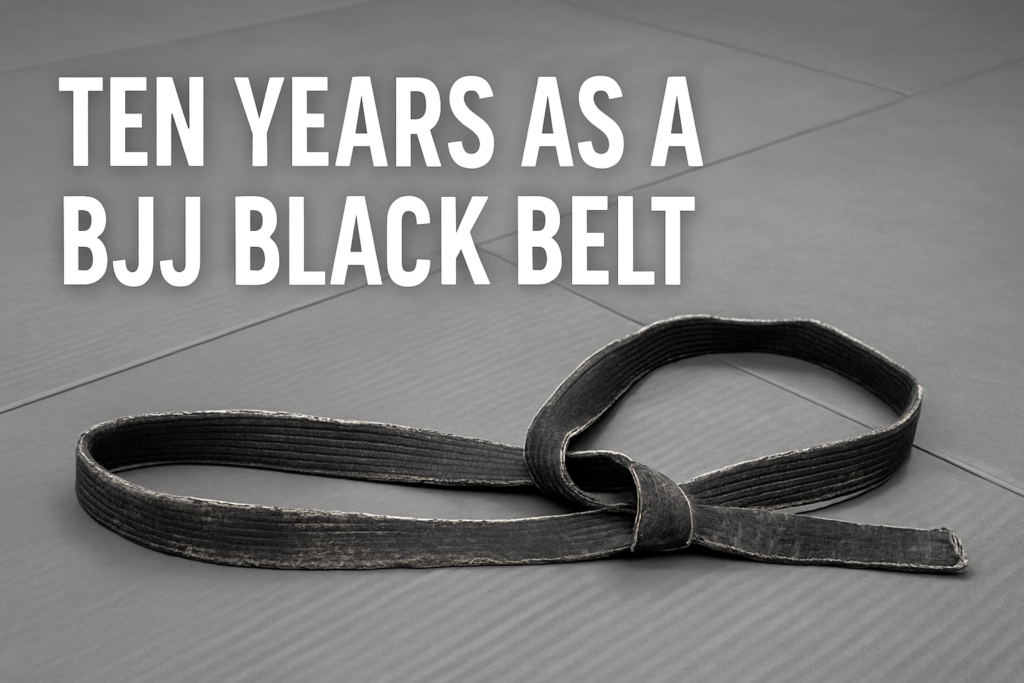8 BJJ Black Belt Lessons from a Decade at Black Belt
On the evening of November 21, 2015, I watched my instructor tie my Brazilian Jiu-Jitsu black belt around my waist. I started training in July of 2007, competing in BJJ and MMA, and teaching every age group along the way. But in those early years, the path to black belt felt unclear. In Louisiana at that time, there was only one black belt in the entire state.
Most of us had never seen a black belt in person, much less understood the road to becoming one. It felt like an impossible task — a direction without a map. All I could do was take it one day at a time.
And that’s what I did.
I didn’t quit.
A decade later, the meaning of the belt has changed. It’s deeper, clearer, and more grounded than it was that night. These are the 8 BJJ black belt lessons that actually mattered over the last ten years.
1. Fundamentals Become Endless, Not Easy
The first of the major BJJ black belt lessons I learned is that fundamentals never stop expanding.
The deeper I went into basics, the more complex they became. I stopped chasing every new guard name or trending technique and focused instead on what Jiu-Jitsu is built on:
-
Body structure
-
Core engagement
-
Limb positioning
-
True positional control
These principles shaped our academy curriculum. Techniques come and go. Fundamentals stay.
And honestly, every technique I thought I understood at black belt…
I had to relearn.
2. Timing and Pressure Decide Everything
A key BJJ black belt lesson is that control comes from two things:
-
Timing
-
Pressure
If your timing is on and your pressure is correct, things work.
If either is off, everything feels wrong.
This lesson reshaped how I train, teach, and roll.
3. Teaching Redefines the Belt
One of the most unexpected BJJ black belt lessons I experienced was how teaching changes your responsibility.
Your belt doesn’t end on the mat — it follows you everywhere.
As BJJ grew on social media, influence became easier to gain but harder to manage. Students watch everything, not just techniques.
And I learned something important:
Everyone begins training for a reason they might not fully understand.
My job is to learn that reason.
White belts get what they need.
Color belts grow through better questions.
Promotions reflect personal development, not time served.
Everyone walks the same miles, even if they start in different places.
4. Self-Defense Is the Root of the Art
Over the years, my priority shifted strongly back to self-defense.
Sport Jiu-Jitsu is valuable — but optional.
Self-defense is not.
A major BJJ black belt lesson is understanding what a real fight looks like and how to protect yourself in it.
This principle guides how I teach today.
5. Competition Is a Tool, Not Purpose
Early on, competition was everything.
Medals felt like proof.
Today, one of my clearest BJJ black belt lessons is this:
Medals tell you who won one match under one rule set on one day.
Nothing more.
What competition truly taught me:
Staying calm under pressure is a superpower.
Training was always comfortable. Competition wasn’t. That contrast forced growth.
I don’t have regrets. Every match taught me something necessary.
6. Culture Matters More Than Ever
Since 2015, the biggest cultural shift in BJJ has been social media.
Anyone can look like an expert if they understand algorithms.
A vital BJJ black belt lesson has been learning to guide ego — mine and others — in a positive direction.
Our academy culture centers on this truth:
Students may not know why they started, but if their reason becomes selfish, they won’t fit here.
We build honesty, effort, and integrity — not hype.
7. Longevity Is the Real Belt
I’ve been fortunate with injuries. The minor ones taught me enough:
Train today in a way that allows you to train tomorrow.
This is one of the most practical BJJ black belt lessons I can offer.
My advice for upper belts:
-
Reduce torque
-
Remove unnecessary pressure
-
Build control first
Longevity is a skill — and one of the most valuable.
8. Legacy Comes from Responsibility
The biggest BJJ black belt lesson after ten years is simple:
Success isn’t measured by medals.
It’s measured by the positive impact you have on those who trust you.
If BJJ disappeared tomorrow, I would keep one principle:
Show up and do your job.
The values I want passed on:
-
Honesty
-
Integrity
-
Helping others
The moment that made me question everything was understanding how much responsibility I have for developing our youth.
The moments that reaffirmed my love for the art were promotions — watching someone earn something they didn’t know they could.
My students changed my Jiu-Jitsu the most.
Legacy?
It isn’t mine.
It’s ours.
🔗 Related Reading
If this message resonated with you, you may appreciate another piece I’ve written — one focused on how challenge and adversity shape young men:
👉 Why Boys Need Conflict to Grow Into Capable Men
❓ FAQ: Common Questions
How long does it take to reach black belt?
Usually 10–15 years of consistent training.
Should I focus on sport or self-defense?
Both matter, but self-defense is the root.
What’s the biggest mistake students make?
Trying to learn everything instead of mastering fundamentals.
How do I train for longevity?
Stay calm, reduce torque, develop control, and recover intentionally.
⭐ Train With Thibodaux’s Most Experienced Black Belt
If you’re in Thibodaux and want to learn Jiu-Jitsu with honesty, structure, and real guidance under Thibodaux’s most experienced black belt, our doors are open.
Click here and take the first step — the rest happens one day at a time.

